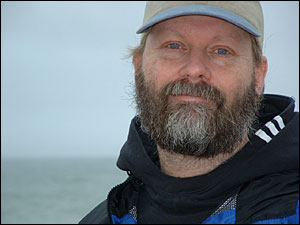Harvard Physicist Christopher Stubbs to Give Two Lectures at Brookhaven Lab
Will discuss dark energy, April 12; search for novel gravitational effects, April 13
March 16, 2010
UPTON, NY — Christopher Stubbs, Chair of the Physics Department at Harvard University, will give two George B. Pegram Lectures – April 12 and 13 – both at 4 p.m. in Berkner Hall at the U.S. Department of Energy’s Brookhaven National Laboratory. Inaugurated in 1959, the Pegram lectures bring distinguished scholars to the Laboratory to speak on topics of both scientific and general interest. Sponsored by Brookhaven Science Associates, the lectures are free and open to the public. Visitors to the Laboratory age 16 and over must bring a photo ID.
In his April 12 lecture, titled “Dark Energy: A Crisis for Fundamental Physics,” Stubbs will discuss the astrophysical observations that show that the current picture of fundamental physics is far from complete. The discovery in 1998 that the expansion of the universe is accelerating presents physicists with a profound challenge. According to the current laws of physics, the expansion should be slowing down because of the force of gravity. In fact, it is expanding at an ever-faster rate. A hypothetical force, known as dark energy, is believed to be causing this expansion.
This inability to understand the expansion based on current physics theory is known as the “dark energy” problem, and it is arguably the most pressing open question in modern physics. In his April 12 talk, Stubbs will explain why the problem constitutes a crisis, with wide-reaching ramifications. In the April 13 talk, titled “Searching for Novel Gravitational Effects,” he will discuss experiments that explore the issue and scientific observations about it.
Christopher Stubbs is an experimental physicist whose interests include experimental tests of the foundations of gravitational physics, searches for dark matter, and observational cosmology. He earned a B.Sc. in physics from the University of Virginia in 1981, and a M.Sc. and Ph.D. in physics, both from the University of Washington, in 1983 and 1988, respectively. He started his career in 1989 as a Fellow at the Center for Particle Astrophysics at the University of California (UC), Berkeley. He was then on the faculty of UC Santa Barbara from 1991 to 1994 before he joined the University of Washington as an associate professor, eventually becoming a professor of physics and astronomy in 1998. In 2003, he joined Harvard University with the same title, and, in 2007, he became chair of Harvard’s Physics Department.
Stubbs has received numerous awards, including a 1993 R&D 100 Award from R&D Magazine for the invention of the MACHO camera system, a digital imaging system used in the experimental search for dark matter. From 1993 to 1995, he was a Sloan Fellow, and from 1994 to 1999, he was a Packard Foundation Fellow. He received the 1996 National Academy of Sciences Award for Initiative in Research and in 1999 he became a Fellow of the American Physical Society, and a Centennial Fellow of the McDonnell Foundation. In addition, he was honored with the NASA Achievement Medal in 2000 and the Gruber Foundation Cosmology Prize in 2007.
Call 631 344-2345 for more information about the lecture. The Laboratory is located on William Floyd Parkway (County Road 46), one-and-a-half miles north of Exit 68 of the Long Island Expressway.
2010-11095 | INT/EXT | Newsroom










